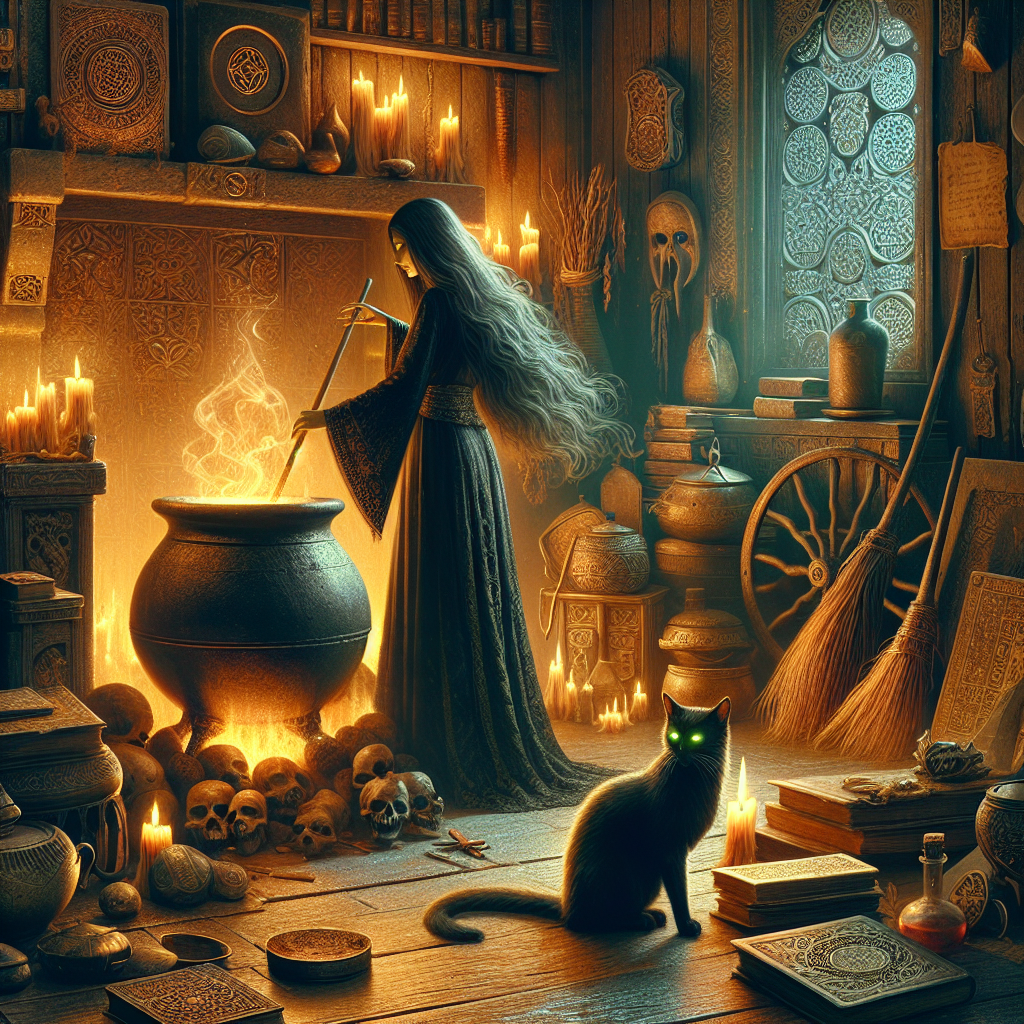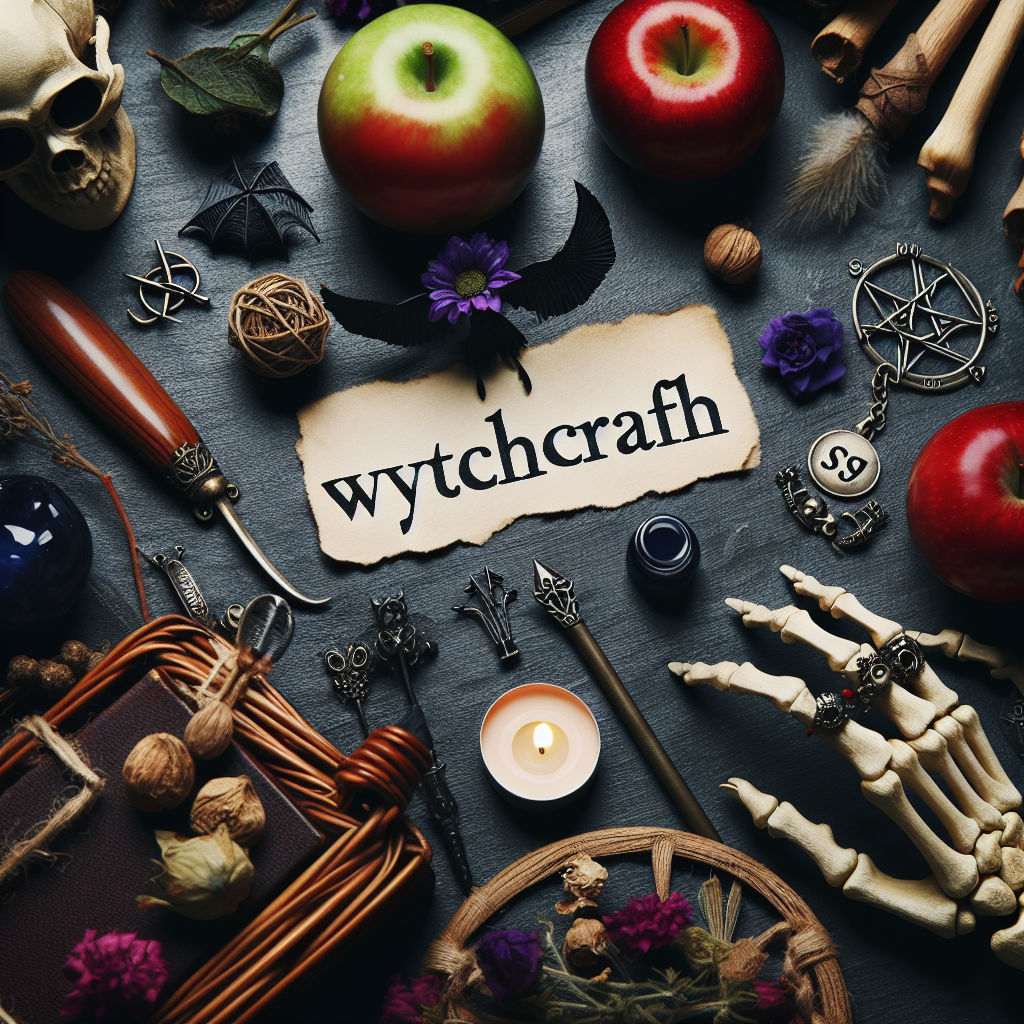As an Amazon Associate I earn from qualifying purchases.
Exploring Synonyms for Witchcraft: Terminology and Usage
Witchcraft, the practice of magic, has captivated human imagination and elicited a plethora of emotions throughout history. From ancient civilizations to modern societies, the term “witchcraft” has resonated with individuals seeking power, understanding, or even fear of the unknown. However, the evolving nature of language has given rise to various synonyms for this mystical craft, contributing to its continued significance in contemporary discourse.
The history of witchcraft dates back to ancient times, where it held a significant place in numerous cultures such as Ancient Egypt, Mesopotamia, and medieval Europe. In these societies, the term “witchcraft” encompassed a broad array of practices, including divination, spellcasting, and communicating with spirits. Despite varying interpretations and associations, the core essence of witchcraft remained the manipulation of natural elements to achieve desired outcomes.
Today, witchcraft continues to hold a place in modern culture, albeit under diverse terminology. The exploration of synonyms for witchcraft opens a fascinating portal into the evolving vernacular of mysticism. Terms such as “Wicca,” “paganism,” and “witchcraft traditions” have emerged to represent specific branches of magical practices, each with its unique set of beliefs, rituals, and cultural associations.
Against the backdrop of an increasingly interconnected world, the significance of understanding and exploring synonyms for witchcraft becomes even more apparent. According to a recent survey, there are an estimated 1.5 million practicing witches across the United States alone, highlighting the growing interest in alternative spiritual practices. As individuals seek solace, empowerment, or simply a connection to nature, this exploration allows for a more comprehensive understanding of the diverse magical traditions that exist today.
Recognizing the shift in language and embracing its associated synonyms not only gives practitioners a sense of identity but also contributes to the preservation and promotion of historical and cultural practices. For instance, while the term “witchcraft” may evoke negative connotations due to centuries of persecution and cultural biases, using alternative terminology like “earth-based spirituality” or “magickal arts” can pave the way for a more inclusive and accepting society.
In conclusion, the exploration of synonyms for witchcraft offers a fascinating glimpse into the varied facets of this mystical practice. From its ancient origins to its modern-day significance, the use of alternative terms such as Wicca, paganism, or witchcraft traditions allows for a more nuanced understanding of magical practices. By recognizing and embracing these diverse terminologies, we not only foster inclusivity and cultural preservation but also gain insight into the ever-evolving nature of human spirituality and quest for empowerment.
What are the different terms for witchcraft and how are they used?
In this article, we will delve into the various synonyms for witchcraft and explore their meanings and usage. Understanding the terminology related to this mystical practice is essential to comprehend its historical context and contemporary significance. Join us as we uncover the definitions behind these terms and discover their relevance in the realm of witchcraft. Stick around to learn more about the fascinating world of witchcraft and its intriguing terminologies.
Exploring Synonyms for Witchcraft: Terminology and Usage
Witchcraft, often associated with the mysterious and occult, has been a topic of fascination and fear throughout history. This ancient practice, typically involving the casting of spells and communing with supernatural forces, has been referred to by various terms over the years. In this article, we will delve into the different synonyms for witchcraft, their meanings, and their usage in contemporary society.
1. Sorcery:
Sorcery is one of the most commonly used synonyms for witchcraft. It refers to the practice of utilizing magic or supernatural powers to influence or manipulate events. Historically, the term sorcery carried negative connotations, often associated with malevolent acts. In modern times, however, it is often used more broadly to encompass both positive and negative magical practices.
2. Wicca:
Wicca, a modern pagan religious movement, is also often used interchangeably with witchcraft. It emerged in the mid-20th century and is characterized by a reverence for nature, the worship of deities, and the practice of magic. Wicca emphasizes individual autonomy and personal spiritual growth, and its practitioners are commonly referred to as witches.
3. The Craft:
“The Craft” is a term that gained popularity with the 1996 film of the same name. It refers to the practice of witchcraft and is often used by those involved in modern pagan and magical traditions. The Craft typically emphasizes the learning and application of magical techniques and rituals for personal empowerment and spiritual development.
4. Paganism:
While not exclusively linked to witchcraft, the term paganism is often associated with the practice. Paganism encompasses a wide range of pre-Christian spiritual traditions that emphasize the worship of multiple deities and a deep connection to nature. Many pagans incorporate magical practices, including witchcraft, into their spiritual beliefs.
5. Occultism:
Occultism refers to the study and practice of hidden or secret knowledge, including witchcraft. It often involves exploring esoteric teachings, divination, and the manipulation of spiritual energies. While not all occultists engage in witchcraft, the two concepts are closely related and often intersect.
6. Magick:
Magick, spelled with a “k” at the end, is sometimes used to distinguish ritualistic and intentional magic from mere illusion or trickery. This spelling was popularized by the influential occultist Aleister Crowley, who believed that adding the “k” would differentiate true spiritual and transformative magic from mere stage magic.
Synonym Witchcraft Usage:
The usage of these synonyms for witchcraft varies among individuals and communities. Some practitioners may identify specifically as witches, while others may relate more closely to the broader umbrella terms of sorcery, Wicca, or paganism. The choice of terminology often depends on personal preference, spiritual beliefs, and the specific traditions or practices one follows.
According to a survey conducted by Pew Research Center in 2014, approximately 0.4% of the U.S. population identifies as Wiccan or pagan, equating to around 1 to 1.5 million people. This statistic highlights the continued relevance and popularity of witchcraft-related practices in contemporary society.
1. What are some common synonyms for witchcraft?
Some common synonyms for witchcraft include sorcery, magic, enchantment, spellcasting, occultism, wizardry, necromancy, and the dark arts.
2. Are all synonyms for witchcraft interchangeable?
While many synonyms for witchcraft share similar meanings, they might have subtle differences in connotation or specific usage. It is always helpful to consider the context in which you are using these terms.
3. How is witchcraft different from sorcery?
Witchcraft generally refers to the practice of magic or spellcasting, often associated with witches. Sorcery, on the other hand, typically refers to the use of supernatural powers gained through pacts with demons or spirits.
4. Is witchcraft considered a negative or evil practice?
Perceptions of witchcraft vary across different cultures and belief systems. While some may view witchcraft as negative or associated with evil, others see it as a spiritual or healing practice. It's important to approach this topic with cultural sensitivity and respect for diverse perspectives.
5. Can anyone practice witchcraft?
Yes, anyone can practice witchcraft if they choose to do so. It is a personal and individual decision to engage in magical practices.
6. Is witchcraft related to religion?
For some individuals, witchcraft is tied to their religious beliefs, such as Wicca or other Pagan traditions. However, not all practitioners of witchcraft are religious, and it can be approached from a secular or spiritual perspective as well.
7. Are there any historical connections between witchcraft and persecution?
Yes, witchcraft has a complex history of persecution, particularly during the Witch Trials in Europe and the American colonies from the 15th to the 18th centuries. It resulted in the wrongful accusation and execution of many people.
8. Are there positive aspects to witchcraft other than magic?
Yes, for many practitioners, witchcraft is a source of personal empowerment, self-discovery, and connection with nature. It can also be a means of spiritual exploration, personal growth, and healing.
9. Are there specific tools or items associated with witchcraft?
While not essential, some practitioners use tools like wands, crystals, herbs, and tarot cards as symbolic aids in their magical practices. These items can help focus intentions and channel energy during rituals or spells.
10. How can one learn more about practicing witchcraft or its terminology?
There are numerous resources available for individuals interested in exploring witchcraft and its terminology. Books, online communities, workshops, and classes provide opportunities to learn from experienced practitioners and delve deeper into understanding this diverse and intriguing subject.

Conclusion
In conclusion, this article delved into the fascinating realm of synonyms for witchcraft, exploring a plethora of terminology and its usage. We discovered that throughout history, different cultures have employed various words to describe the practice of witchcraft, highlighting the rich diversity of human beliefs and traditions.
A key insight from this exploration is that synonymous terms for witchcraft often carry nuanced connotations and cultural significance. For instance, words like “sorcery” and “sorceress” generally connote the use of magical powers for malicious purposes, whereas “white magic” emphasizes the benevolent nature of the craft. Moreover, we learned that certain cultures have their own unique terminologies, such as “bruja” in Latin America and “obeah” in the Caribbean, reflecting the deep-rooted beliefs and practices within these regions.
This article also shed light on the evolution of terminology over time. While terms like “witch” and “wizard” have long been associated with practitioners of witchcraft, modern language has seen the emergence of gender-neutral terms like “witcher” or “witchfolk,” reflecting the importance of inclusivity and gender equity in contemporary society.
Overall, this exploration of synonyms for witchcraft has provided us with a comprehensive understanding of the linguistic landscape surrounding this fascinating subject. It has reminded us of the power of words in shaping our perceptions and attitudes, and the importance of cultural context when examining terminology. By embracing the diversity of synonyms, we can appreciate the intricate tapestry of human beliefs and spirituality across the globe.
Amazon and the Amazon logo are trademarks of Amazon.com, Inc, or its affiliates.


